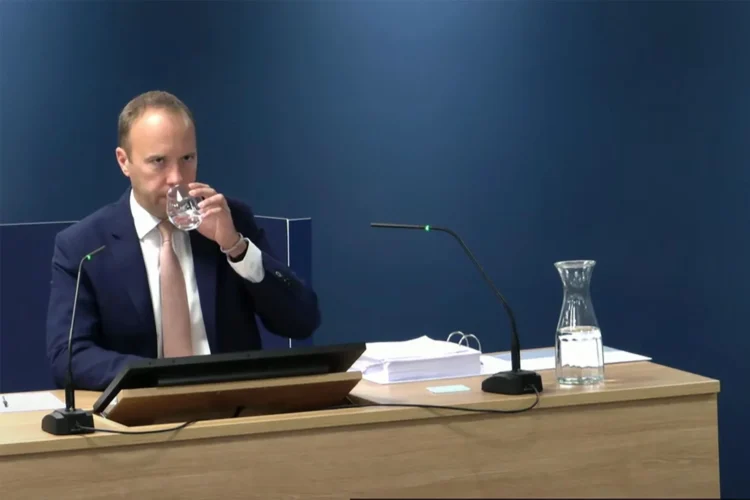By Ben Kerrigan-
Former health secretary Matt Hancock has criticised the UK’s pandemic planning ahead of the Covid pandemic, saying it was too focused on dealing with deaths rather than averting them, and profoundly apologising for the resulting deaths.
He told the Covid inquiry the focus was to plan for the consequences of a disaster: “Can we buy enough body bags, where are we going to bury the dead? That was completely wrong,” he said, adding that he was “profoundly sorry” for each death, but acknowledged that – for some – his apology would be “hard to take”.
The former health secretary said central considerations were: “Can we buy enough body bags, where we are going to bury the dead?”
He added that the government also had no idea whether care homes had the right protections in place, Hancock said – describing the situation as “terrible”
In response to questions about the recommendations from Exercise Cygnus, a three-day test run in October 2016 to find out how prepared the UK was for a influenza pandemic, and which concluded that the UK’s plan were not sufficient to “cope with the extreme demands of a severe pandemic”
Only eight of the 22 recommendations made after that exercise had been fully addressed by the time Covid hit with work on the other 14, including to prepare the social care sector, still ongoing.
Mr Hancock said that some of that work had been paused because of the need to prepare the country for a no-deal Brexit, adding that he was “not convinced” that, even if all those recommendations had been addressed, the country would have been in a better place to deal with Covid.
He described Exercise Cygnes as “flawed in its central assumption” that a pandemic was a disaster that needed to be “cleaned up” rather than something that needed to be stopped or contained in the first place.
He said: “The doctrinal floor was the biggest by a long way because if we’d had a flu pandemic, we still would have had the problem of no plan in place for lockdown, no prep for how to do one, no work on what, how best to lock down with the least damage.
“I understand deeply the consequences of lockdown and the negative consequences for many, many people – many of which persist to this day.”
He said he had to overrule initial advice not to quarantine people being brought back from Wuhan early in the pandemic, and that everybody in the Western world missed that lockdowns would be necessary.
He said the government also had no idea whether care homes had the right protections in place, describing the situation as “terrible”.
His statement confirms others during the inquiry about the effectiveness of the UK’s preparedness measures, the allocation of resources, and the prioritization of preventive strategies. This essay will explore the implications of Hancock’s remarks, emphasizing the need for robust preventive planning and proactive measures to mitigate the impact of future pandemics.
The focus on managing the consequences rather than preventive measures may have led to insufficient allocation of resources for surveillance, early detection, and rapid response capabilities.
His comments will raise questions about the government’s prioritization of healthcare infrastructure, research and development, and emergency planning to ensure a resilient and proactive response.
Nhs analyst, Amber Smart said: ”Hancock’s statements so far suggests the Uk simply had no real plan to avert a pandemic or respond to it quickly enough. A preventive approach encompasses ensuring adequate healthcare infrastructure, a robust workforce, and sufficient medical supplies to effectively respond to crises. Investing in healthcare system resilience is essential to mitigate the strain on hospitals, healthcare professionals, and critical resources during a pandemic.
”Hancock’s statement will contribute to prompting policymakers to critically evaluate and reform pandemic planning strategies for the future.
”This will includes strengthening the regulatory framework, improving risk assessments, investing in research and development for new treatments and vaccines, and prioritizing preventive measures in resource allocation. A comprehensive review of policies and protocols will help ensure that future planning is better equipped to prevent and manage pandemics effectively”.
Hancock was forced out of his job after breaking covid regulations by having a close physical affair with colleague, Gina Colandagelo at a time when social distancing guidelines were actively in place. He went on to breach the parliamentary code of conduct by appearing in ‘I’m a Celebrity Get Me Out Of here’, without obtaining prior permission from parliament as required.
Matt Hancock was heckled as he leaves the Covid Inquiry building in central London, with people shouting “killer” and “how many have died?” at him.
Campaign groups representing those who’ve lost loved ones during the pandemic turn their backs on him in unison as he ran down the steps of Dorland House and jumped into a waiting car.
Image:PA




